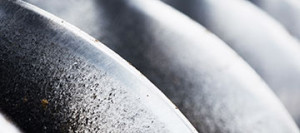 Swedish-Finnish steel company Ssab, mining company Lkab and power company Vattenfall have joined together to develop a steel production process that emits water rather than carbon dioxide, called Hybrit (Hydrogen Breakthrough Ironmaking Technology). The goal of the project is to reduce carbon dioxide emissions from ironmaking to zero by eliminating the need to use fossil fuel for iron ore reduction. The idea is to replace the blast furnaces with an alternative process, using hydrogen produced from “clean” electricity.
Swedish-Finnish steel company Ssab, mining company Lkab and power company Vattenfall have joined together to develop a steel production process that emits water rather than carbon dioxide, called Hybrit (Hydrogen Breakthrough Ironmaking Technology). The goal of the project is to reduce carbon dioxide emissions from ironmaking to zero by eliminating the need to use fossil fuel for iron ore reduction. The idea is to replace the blast furnaces with an alternative process, using hydrogen produced from “clean” electricity.
Ssab says that its existing production system is already one of the world’s most efficient in terms of carbon dioxide emissions; nevertheless, existing steelmaking technology using coke plants and blast furnaces means Ssab is Sweden’s largest single source of carbon dioxide emissions.
Steelmaking starts with the processing of iron ore (Fe2O3) into molten iron. Blast furnace ironmaking or any ironmaking process requires more energy and releases more CO2 than any other process to produce steel. The reduction of Fe2O3 (iron ore) to Fe (iron) is by far the most energy-intensive step.
The direct reduction method of ironmaking (DRI) was originally developed to overcome some of the energy and emissions difficulties of conventional blast furnaces.
Conventional direct reduced iron is produced by the reduction (removal of oxygen) of iron oxide lumps or pellets at 800-1050 °C—below the melting point of iron (1536 °C)—by interaction with reductants (H2+CO) derived from natural gas or coal.
The specific investment and operating costs of direct reduction plants are low compared to integrated steel plants and are more suitable for many developing countries where supplies of coking coal are limited.
The basic concept behind Hybrit is to replace the reductants with hydrogen produced from “clean” electricity from Vattenfall.
Lkab is already a world-leading producer of direct reduction iron ore pellets. Direct reduction pellets are very low gangue (commercially worthless material that surrounds ore) and rich in iron, giving high energy efficiency in the direct reduction process as well as in the following electric arc furnace process.
The Hybrit project has an almost 20-year timeline: pre-feasibility study from 2016-2017, feasibility study-pilot plant trials from 2018-2024 and demonstration plant trials from 2025-2035.
The project will also mean a major contribution to a fossil-free Sweden. Implementation of the project will also require national contributions from the state, research institutions and universities over the next 20-25 years.



